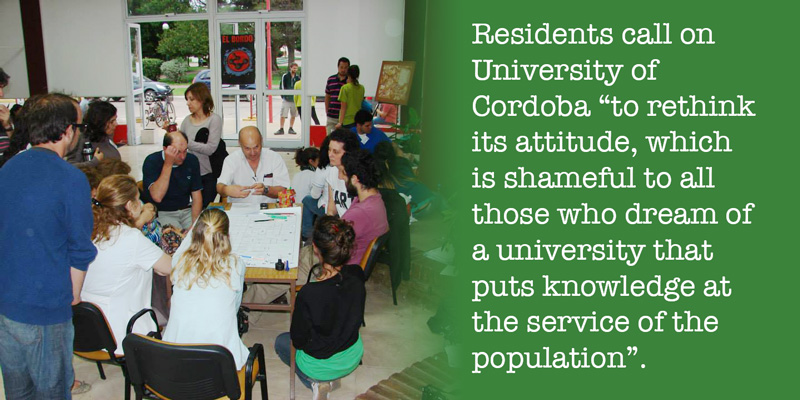
Residents call on University of Cordoba "to rethink its attitude, which is shameful to all those who dream of a university that puts knowledge at the service of the population"
More details have emerged about the National University of Cordoba’s proceedings against Dr Medardo Avila Vazquez, whose research linked the cases of cancer and malformations in the Argentine town of Monte Maiz with the use of GMOs and chemicals.
The new details appear in an article by the Argentine journalist Dario Aranda in the newspaper Pagina12.
According to the article, the dean of the Faculty of Agricultural Sciences, National University of Cordoba (UNC), Juan Marcelo Conrero, took the highly unusual step of requesting an administrative inquiry and sanctions into the actions of the teacher and researcher at the Faculty of Medicine, Medardo Avila Vazquez.
The request was made after Avila Vazquez coordinated a health survey in the town of Monte Maiz, where he confirmed high rates of cancer, birth defects and spontaneous abortions. He linked the disease to transgenic and agrochemicals. Avila Vazquez commented, ”It is a clear ideological persecution. If the study had been favorable to Monsanto they would not have said anything – they would have praised it.”
The residents of Monte Maiz, the Faculty of Sciences of La Plata (which also participated in the health survey) and researchers from twelve countries supported Avila Vazquez.
In October 2014, the team of 70 researchers and students took up residence in Monte Maiz, a town of 8,000 inhabitants 300 kilometers from the capital of Cordoba. At the request of local organizations and the mayor, Luis Maria Trotte (Front for Victory party), stayed for five days and carried out a survey. The results: new cases of cancer are twice the national average, spontaneous abortions five times the national average, cancer mortality is three times the provincial average and the number of malformations are three times those in the records of Cordoba.
The team was composed of researchers from the Universities of Cordoba and La Plata (UNLP). The coordinator was Medardo Avila Vazquez.
The Board of the Faculty of Medicine accused the work of "lacking scientific backing”. He said the university did not authorize the survey and noted that it did not have the approval of the Ethics Committee.
The answer was provided by the Bioethics Committee of Environmental Health Study of Monte Maiz (a group of experts who had supervised the work). In a document of ten points they recalled that UNC’s own Faculty of Medicine disbanded the university’s Ethics Committee in order that it could not participate in the research. It added that the study was endorsed by the Board of Medical Sciences and by an agreement signed by the UNC rector, Francisco Tamarit, and Mayor Trotte.
The Bioethics Committee (composed of researchers and professionals from UNC, UNLP and the National University of Comahue) said that the work of Monte Maiz meets national and international scientific requirements and is subject to provincial and national legislation.
But the dean of Agricultural Sciences applied to the High Council of UNC and sought sanctions against the researcher. "I request that administrative actions are set in motion to investigate whether the actions of the doctor Medardo Avila Vazquez and the team merit disciplinary sanction,” begins Conrero’s letter.
Conrero said that the researchers had ”over-reached" in their work. He complained that they had spread "misleading" information and accused them of causing "fear" in the community of Monte Maiz. “For the sake of this prestigious university we cannot allow members of the same university to deceptively disseminate scientifically unvalidated data, causing irreparable damage to society," he said. Conrero did not mention any actual mistakes in the investigation.
The Monte Maiz residents who requested the survey, comprising the Network for Environmental Protection and Health, issued a statement in solidarity with Avila Vazquez. "We reject all manoeuvers of the outgoing Dean of the Faculty of Medicine (Gustavo Irico) to try to discredit this work (which was so much desired by our people). We repudiate all the insults poured on the person and the qualifications of Dr Avila Vazquez. We also reject the attitude of Dean Juan Conrero, who is acting in defence of the interests of the multinational company (Monsanto)," the statement said.
Conrero took office in June 2014. And only two months later, he signed a collaboration agreement with Monsanto. Monsanto is embroiled in a conflict with the Cordoba town of Malvinas Argentinas, which is resisting the company’s plan to build the largest GM maize installation in Latin America. Jorge Omar Dutto is the general secretary of the Faculty and Conrero’s right-hand man. He was also one of the authors of Monsanto’s environmental impact report written to support its application to build the installation in Cordoba.
Socio-environmental groups and organizations from Malvinas Argentinas and the capital city of Cordoba, along with teachers and students of the UNC, mobilized and denounced the contract between the Faculty of Agricultural Sciences and Monsanto. Conrero was forced to back down and suspend the agreement.
The residents’ Network for Environmental Protection and Health of Monte Maiz stressed the importance of the work of all the researchers, but especially Avila Vazquez. They explained that, along with the council, they are working on an ordinance to limit the spraying and called the authorities of UNC "to rethink its attitude, which is shameful to all those who dream of a university that puts knowledge at the service of the population”.
Report: Claire Robinson, based on an article in Spanish by Dario Aranda in Pagina12










